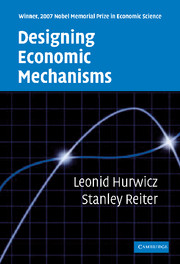4 - Revelation Mechanisms
Published online by Cambridge University Press: 24 May 2010
Summary
Introduction
This chapter establishes an elementary lower bound on the computational complexity of differentiable functions between Euclidean spaces (actually, differentiable manifolds). The main motivation for this comes from mechanism design theory and as a result, the functions we examine are defined on products of differentiable manifolds and generally have values that are vectors in a Euclidean space. The complexity of computations required by a mechanism determines an element of the costs associated with that mechanism. The lower bound presented in this paper is useful in part because it does not require specification in detail of the computations to be performed by the mechanism, but depends only on the goal function that the mechanism is to realize or implement.
Our lower bound generalizes a bound due to Arbib and Spira (Arbib 1960, Spira 1969, Spira and Arbib 1967) for the complexity of functions between finite sets. The Arbib–Spira bound is based on the concept of separator sets for a function. A little later, in Section 4.1.2 of this introduction and in the next paragraph, we discuss briefly the concept and uses of separator sets. A complete description is given in Section 4.2. This concept is used to determine a lower bound to the number of Boolean variables – variables whose values are either 0 or 1 that the function actually depends on. In the finite case the number of variables can be counted easily. But a counting procedure is too crude to be used for functions between infinite sets.
- Type
- Chapter
- Information
- Designing Economic Mechanisms , pp. 296 - 334Publisher: Cambridge University PressPrint publication year: 2006



